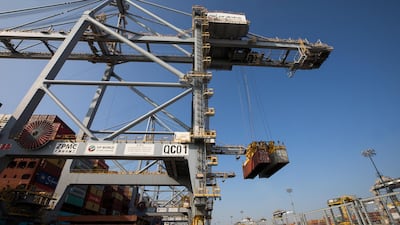The recovery from the economic slump caused by Covid-19 weakened in the UK and the eurozone this month, with data indicating that although many parts of the economy continued to reopen, consumer confidence remains low.
The Flash UK Composite PMI data, a one-stop measure of private sector activity, dropped to 55.7 for September, still comfortably above the 50.0 reading that separates expansion from contraction, but a decline to a three-month low from 59.1 in August.
In the eurozone, the 50.1 reading was only marginally above neutral threshold and also at a three-month low from 51.9 in August.
“The eurozone’s economic recovery stalled in September, as rising Covid-19 infections led to a renewed downturn of service sector activity across the region," Chris Williamson, chief business economist at data compiler IHS Markit, said.
A "two-speed economy" is in place across the region, Mr Williamson said, with factories reporting stronger production growth on the back of higher demand, but workers in the service sector were facing more layoffs as companies struggling with lower revenues look to keep costs in check.
Manufacturers in the UK also reported their strongest level of new export orders in 18 months. However, services sector businesses "remained gloomy about future plans and turned instead towards shedding jobs at a distressing rate, especially among those reliant on consumer footfall", Duncan Brock, group director at the Chartered Institute of Purchasing and Supply, said.
A slump in demand is the main factor weighing on UK employment numbers, but anecdotal evidence suggested the closure of the government's furlough scheme at the end of this month is accelerating moves to reduce headcount.
Companies in the eurozone and the UK remain confident on the outlook for the next 12 months, but in the UK that optimism is more muted as fears grow over the resurgence of new Covid-19 infections.
UK prime minister Boris Johnson introduced a tougher set of restrictions to stem the spread of the virus on Tuesday, with office workers being encouraged to remain at home. The pandemic has infected more than 403,000 people in the country so far and killed 41,825, according to Worldometer data.
Eurozone optimism also rests on infection rates falling over the next few months, but this is "far from guaranteed", Mr Williamson said.
"The main concern at present is whether the weakness of the September data will intensify into the fourth quarter, and result in a slide back into recession after a frustratingly brief rebound in the third quarter,” he added.
The UK's FTSE 100 index was trading 2.5 per cent higher by 2.01pm UAE time and the Eurostoxx 600 index was up 1.5 per cent.


